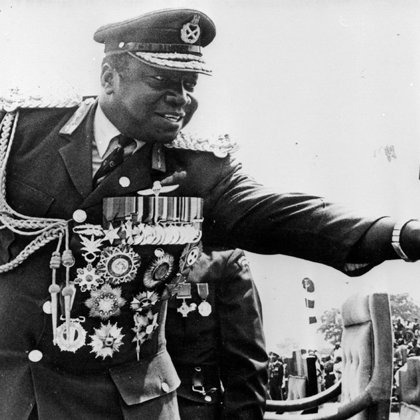IDI AMIN DADA WAS A MONSTROUS LEADER,HE WAS AN OBVIOUS BULLY.HE BECAME KNOWN AS THE "BUTCHER OF UGANDA" FOR HIS BRUTAL,DESPOTIC RULE CHILE PRESIDENT OF UGANDA IN THE 1970s.HE IS POSSIBLY THE MOST NOTORIOUS OF ALL AFRICA'S POST-INDEPENDENCE DICTATORS.500,000 PEOPLE WERE KILLED DURING HIS EIGHT YEARS RULE.
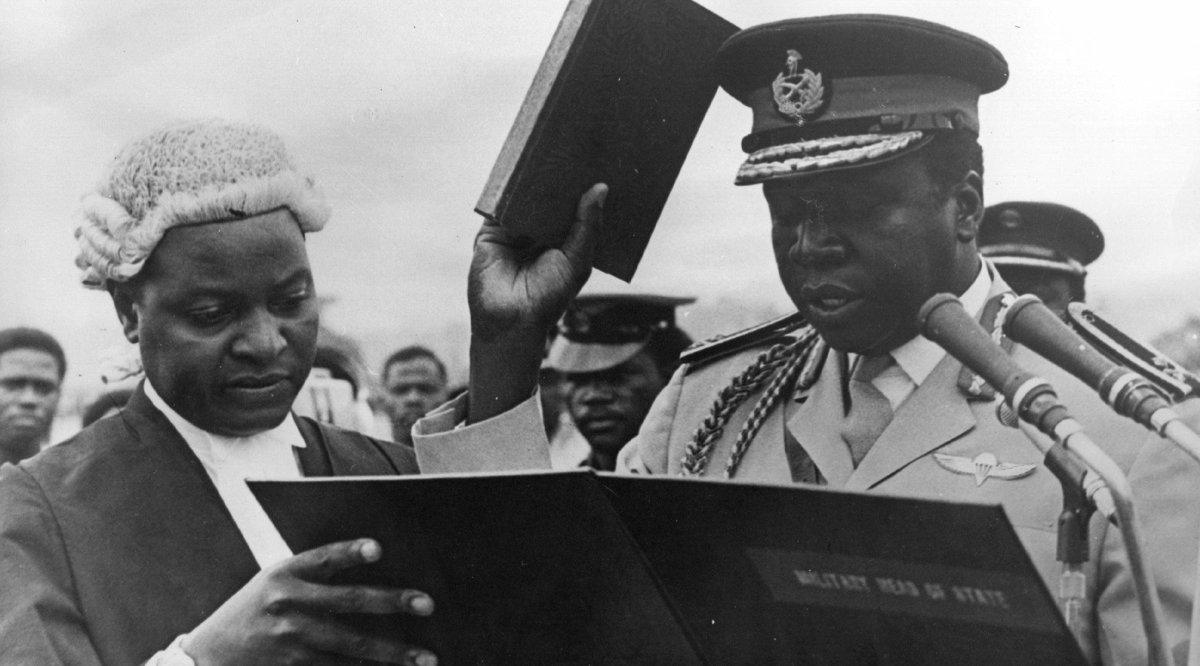 Amin imposed military rule, essentially throwing out the Ugandan constitution. Amin’s military tribunals held authority over Uganda’s judicial courts, leaving Amin with unchecked power. He turned the presidential residence into his command center and base of operations.Amin eliminated anyone who posed a threat to him; real or imagined, often using torture to get information out of his perceived enemies. His first move as President of Uganda was to free many political prisoners, thus forming alliances with them. He then dispatched kill squads to hunt down and execute any known supporters of Milton Obote. The kill squads soon targeted people from various ethnic groups, suspected homosexuals, journalists and students.
Amin imposed military rule, essentially throwing out the Ugandan constitution. Amin’s military tribunals held authority over Uganda’s judicial courts, leaving Amin with unchecked power. He turned the presidential residence into his command center and base of operations.Amin eliminated anyone who posed a threat to him; real or imagined, often using torture to get information out of his perceived enemies. His first move as President of Uganda was to free many political prisoners, thus forming alliances with them. He then dispatched kill squads to hunt down and execute any known supporters of Milton Obote. The kill squads soon targeted people from various ethnic groups, suspected homosexuals, journalists and students.
Idi Amin Dada was the third President of Uganda. On this day (2nd Feb 1971) Idi Amin Dada was a military leader turned president of Uganda, who was in power from 1971 to 1979. Amin was a very charismatic but ruthless leader. His style of ruling was brutal, and ran the country economically poorly. Amin ignored human rights, repressed the Ugandan people, racially persecuted the people and executed the people without hesitation.His father leftt the family while Dada was still a young boy, he was then raised by his mother, a herbalist and diviner.Idi Amin received little formal education.He was a member of the Kakwa ethnic group, a small Islamic tribe that was settled in the region. In 1946, Dada joined the King’s African Rifles, KAR (Britain’s colonial African troops), and served in Burma, Somalia, Kenya (during the British suppression of the Mau Mau) and Uganda. He rose through the ranks, reaching sergeant-major before finally being made an effendi, the highest rank possible for a Black African serving in the British army.He seized power in a military coup in 1971 and ruled over Uganda for 8 years. Estimates for the number of his opponents who were either killed, tortured, or imprisoned vary from 100,000 to half a million. In 1979, his reign of terror came to an end as Ugandan exiles and Tanzanians took control of the capital of Kampala, forcing Amin to flee. Never brought to justice for his heinous crimes, Amin lived out the remainder of his life in Saudi Arabia.Died in 2003 from kidney failure.Amin was the president of Uganda and abused the powers that came with it. Being the president, he had the ultimate power; political, lawful, anything you can think of. He appointed himself to Commander-in-Chief of the Armed Forces, Army Chief of Staff, and Chief of Air Staff. During his reign, he directed most of the countries money towards the military; improving the number of soldiers and equipment.Amin was close with the president before him, but over time, their relationship deteriorated and Amin decided to seize power with a military coup over the then president while he was at a commonwealth meeting.At the beginning of his time as president, Amin had promised to free political prisoners and he did so shortly after. One week after his siege, Amin declared himself president of Uganda, Commander-in-Chief of the Armed Forces, Army Chief of Staff and Chief of Air Staff. He then announced that he was suspending certain aspects of the Ugandan constitution and soon brought in an advisory council with military officers and himself as chairman being a part of it. After that, he replaced the civil law with military tribunals and gave soldiers top government positions. Following the change of law and military officials in the top jobs, Amin started his brutality by accusing certain Ugandan people of criminal acts and executing them. Sometimes, not even bothering to accuse them. Some of the ethnic groups involved were the intellectually gifted, foreigners, politicians, reporters, homosexuals, religious leaders, lawyers, judges and other nationalities of people. During his reign, its believed that Amin killed between 100,000 to 500,000 of the Ugandan people and other foreigners within the country.In some ways, Amin was a very corrupt man, depending how you define corrupt. He was more often viewed as a very erratic, unpredictable and outspoken dictator. He gave himself many titles and appointed himself the leader of many branches within Uganda. He was easily influenced by Gaddafi during their early years as allies, which is proven when Gaddafi told Amin to expel all Ugandan Asians from Uganda in 1972. Amin was most definitely a greedy man, giving himself many titles and selfishly directing most of Ugandas money towards military aid, leaving his people to suffer economic horrors. He was an erratic man with a very short temper, a reason why so many people died in his time as the president.Overall, Amin started his reign with good intentions; to help his people and to help his country to become a better land. But as time went on, the power went to his head and he abused the Ugandan people, the foreigners who lived within the country and the rights he bestowed upon himself. He was a monstrous leader.He was an obvious bully but capable of menacing charm. He was by no means stupid though he devoted his energy to preserving his own tyranny as well as liquidating his enemies and those who possessed something he wanted, like an attractive wife.
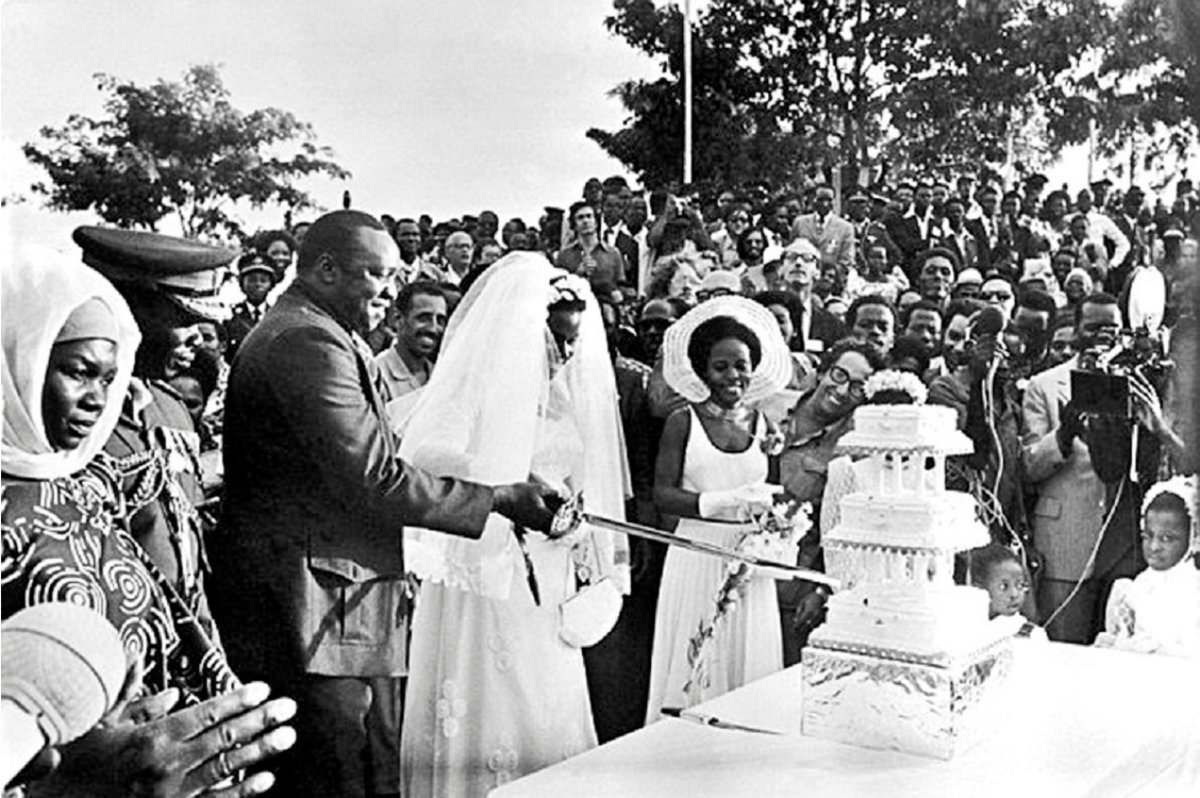 Idi Amin and Sarah Kyolaba married after he spotted her performing at the age of 19. They are pictured on their wedding day in 1975.She married the dictator after he spotted her performing at the age of 19. The pair were later married in a lavish £2million ceremony in the country's capital Kampala. She was said to be his 'favourite wife' and went by the title Lady Sarah Kyolaba Idi Amin.
Idi Amin and Sarah Kyolaba married after he spotted her performing at the age of 19. They are pictured on their wedding day in 1975.She married the dictator after he spotted her performing at the age of 19. The pair were later married in a lavish £2million ceremony in the country's capital Kampala. She was said to be his 'favourite wife' and went by the title Lady Sarah Kyolaba Idi Amin.
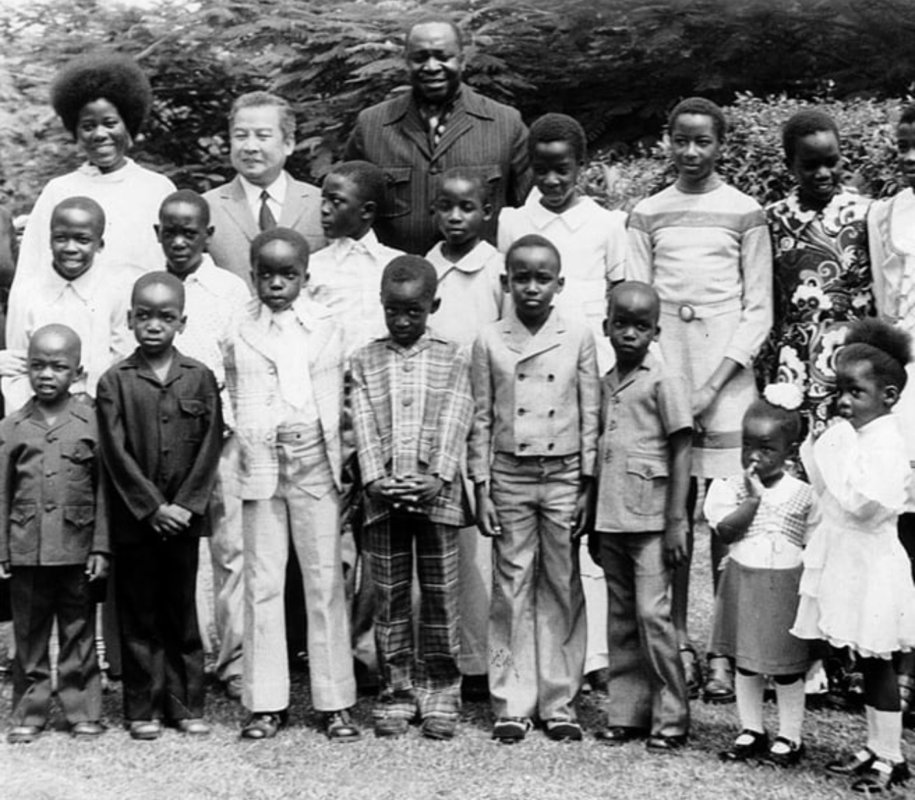 Idi Amin, who reportedly fathered 43 children, Taban Amin, Jaffar Amin, Faisal Wangita, Ali Amin, Mwanga Amin, Moses Amin, Hussein Amin, Khadija Abria Amin, Haji Ali Amin, Maimuna Amin, Wasswa Amin, Iman Amin, Kato Amin.He was forced from Uganda in 1979, fled to Libya, then Iraq and finally Saudi Arabia, where he was allowed to settle provided he stayed out of politics.
Idi Amin, who reportedly fathered 43 children, Taban Amin, Jaffar Amin, Faisal Wangita, Ali Amin, Mwanga Amin, Moses Amin, Hussein Amin, Khadija Abria Amin, Haji Ali Amin, Maimuna Amin, Wasswa Amin, Iman Amin, Kato Amin.He was forced from Uganda in 1979, fled to Libya, then Iraq and finally Saudi Arabia, where he was allowed to settle provided he stayed out of politics.
Idi Amin Dada, a former heavyweight boxing champion, was the military dictator and self-appointed president of Uganda during the 1970s. When he took control of the small African country back in 1971 the people hailed him as a hero. However, they could not have know what kind of man their glorious General would prove himself to be. Maybe the pressures of leadership got to him because pretty soon he began to act very strangely indeed.Of all Amin’s larger than life characteristics, his ego is perhaps the most famous. He awarded himself many titles and honours, eventually styling himself as ‘His Excellency, President for Life Field Marshall Al Hadj Doctor Idi Amin Dada, VC, DSO, MC. Lord of all the Beasts of the Earth and Fishes of the Sea and Conqueror of the British Empire in Africa in General and Uganda in Particular’. This made him one of the most powerful men in the world, in his own mind at least. But there was one title he did not award himself – that of king. This is not to say that he did not wish to be a king, however. He is rumored to have sent a love letters to Queen Elizibeth II of England, proposing marriage and even that he be made King of Scotland. This is a strange thing for any man to do, especially one known to have despised the British. Of course, Queen Elizabeth did not return Amin’s affections. Perhaps she was turned off by the knowledge that he was a polygamist, amongst other things. He is known to have married at least six women throughout his life, one of whom was found dead, her body horrifically mutilated, after falling pregnant to another man. Amin is also thought to have fathered as many as 43 children.Extremely charismatic and skilled, Amin quickly rose through the ranks. His stature was rather notable. He stood six feet, four inches tall and was a Ugandan boxing champion from 1951 to 1960, as well as a swimmer. He soon became notorious among fellow soldiers for his overzealous and cruel military interrogations. Eventually he made the highest rank possible for a Black African serving in the British Army. From 1952 until 1956, he served in the Allied forces’ Burma campaign during World War II, and in the British action against the Mau Mau revolt in Kenya (1952–56).Before Uganda’s independence in 1962, Amin became closely associated with the new nation’s prime minister and president, Milton. The two men worked to smuggle gold, coffee and ivory out of Congo, but conflicts soon arose between them, and on January 25, 1971, while Obote was attending a meeting in Singapore, Amin staged a successful military coup. Amin became president and chief of the armed forces in 1971, field marshal in 1975 and life president in 1976. Idi Amin was initially welcomed both within Uganda and by the international community. King Freddie had died in exile in 1969 and one of Amin’s earliest acts was to have the body returned to Uganda for state burial. Political prisoners (many of whom were Amin followers) were freed and the Ugandan Secret Police was disbanded. However, at the same time Amin had ‘killer squads’ hunting down Obote’s supporters.Idi Amin awarded himself many titles and honors, eventually styling himself as ‘His Excellency, President for Life Field Marshall Al Hadj Doctor Idi Amin Dada, VC, DSO, MC. Lord of all the Beasts of the Earth and Fishes of the Sea and Conqueror of the British Empire in Africa in General and Uganda in Particular’. This made him one of the most powerful men in the world, in his own mind at least.Amin persecuted many members of many ethnic groups including religious leaders, journalists, artists, senior bureaucrats, judges, lawyers, students and intellectuals, criminal suspects, and foreign nationals. In this atmosphere of violence, many other people were killed for criminal motives or simply at will. Bodies were often dumped into the Nile River.Amin became known as the “Butcher of Uganda” for his brutality. It is believed that some 300,000 people were killed during his presidency. In July 1976 he was personally involved in the hijacking of a French airliner to Entebbe. In October 1978 Amin ordered an attack on Tanzania. Aided by Ugandan nationalists, Tanzanian troops eventually overpowered the Ugandan army. As the Tanzanian-led forces neared Kampala, Uganda’s capital, on April 13, 1979.
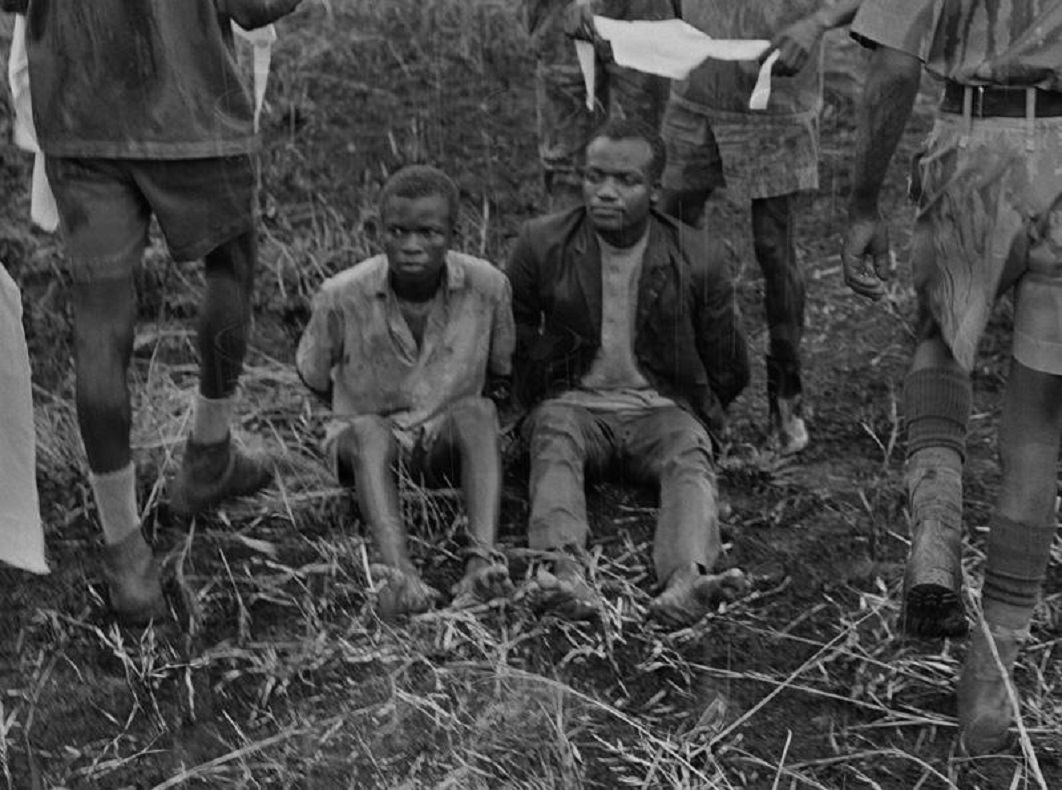
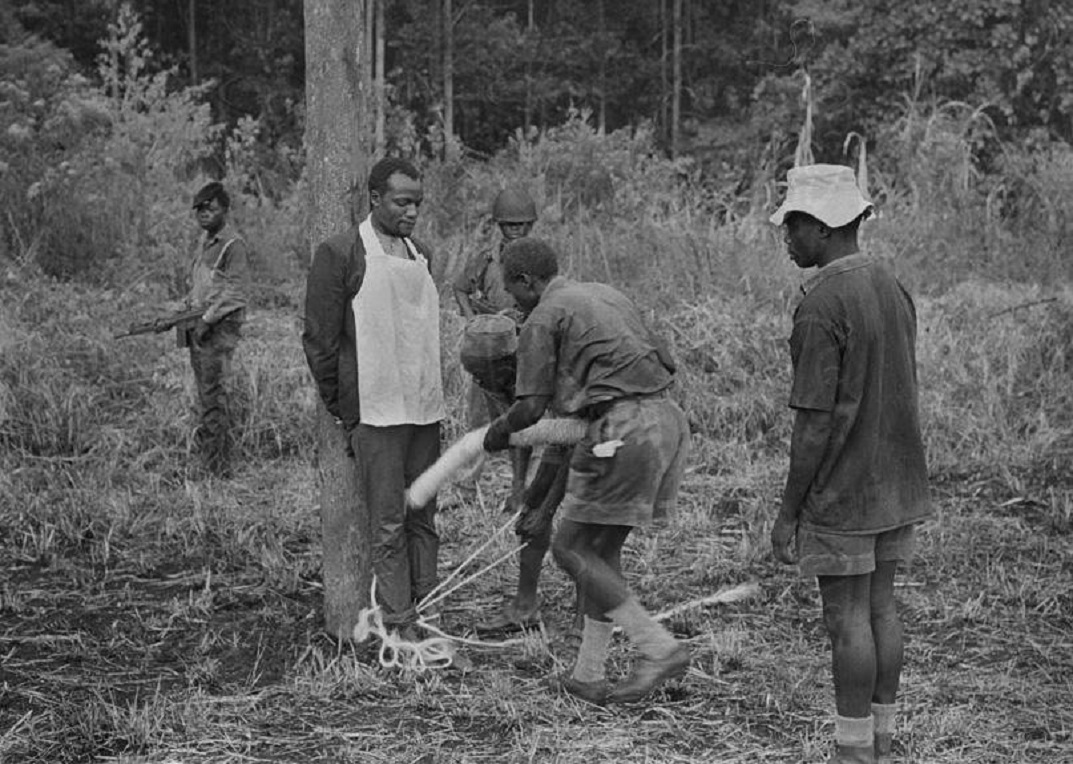 Idi Amin Executions: A crowd of twenty-thousand Ugandans, including women and children, watched from a stadium in a pouring rain as Ugandan soldiers prepared for execution by firing squad two alleged guerrillas from Bugsihu, Tom Masaba, a former captain in the Ugandan Army and Sebastino Namirundu (pictured), Mbale, February 1973. Masaba and Namirundu were interrogated, stripped naked, fitted with short white aprons and tied to their execution posts. Masaba, who was accused of being a terrorist, was reported to have said, "Let those, like me, who are killing innocent people in the country, come out and report to the authorities.
Idi Amin Executions: A crowd of twenty-thousand Ugandans, including women and children, watched from a stadium in a pouring rain as Ugandan soldiers prepared for execution by firing squad two alleged guerrillas from Bugsihu, Tom Masaba, a former captain in the Ugandan Army and Sebastino Namirundu (pictured), Mbale, February 1973. Masaba and Namirundu were interrogated, stripped naked, fitted with short white aprons and tied to their execution posts. Masaba, who was accused of being a terrorist, was reported to have said, "Let those, like me, who are killing innocent people in the country, come out and report to the authorities.
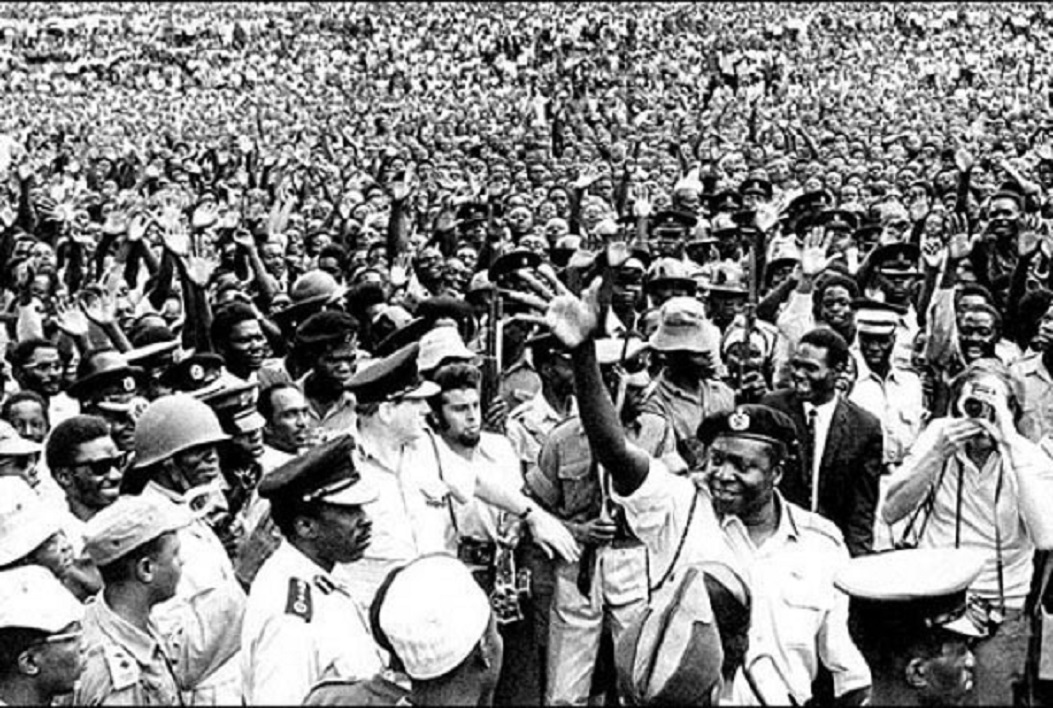 In October 1970, Obote himself took control of
the armed forces, reducing Amin from his months-old post of commander
of all the armed forces to that of commander of the army.Having
learned that Obote was planning to arrest him for misappropriating army
funds, Amin seized power in a military coup on 25 January 1971, while
Obote was attending a Commonwealth summit meeting in Singapore.Troops
loyal to Amin sealed off Entebbe International Airport, the main
airport, and took Kampala. Soldiers surrounded Obote's residence and
blocked major roads. A broadcast on Radio Uganda accused Obote's
government of corruption and preferential treatment of the Lango region.
Cheering crowds were reported in the streets of Kampala after the radio
broadcast. Amin announced that he was a soldier, not a politician, and
that the military government would remain only as a caretaker regime
until new elections, which would be announced when the situation was
normalised. He promised to release all political prisoners.
In October 1970, Obote himself took control of
the armed forces, reducing Amin from his months-old post of commander
of all the armed forces to that of commander of the army.Having
learned that Obote was planning to arrest him for misappropriating army
funds, Amin seized power in a military coup on 25 January 1971, while
Obote was attending a Commonwealth summit meeting in Singapore.Troops
loyal to Amin sealed off Entebbe International Airport, the main
airport, and took Kampala. Soldiers surrounded Obote's residence and
blocked major roads. A broadcast on Radio Uganda accused Obote's
government of corruption and preferential treatment of the Lango region.
Cheering crowds were reported in the streets of Kampala after the radio
broadcast. Amin announced that he was a soldier, not a politician, and
that the military government would remain only as a caretaker regime
until new elections, which would be announced when the situation was
normalised. He promised to release all political prisoners.